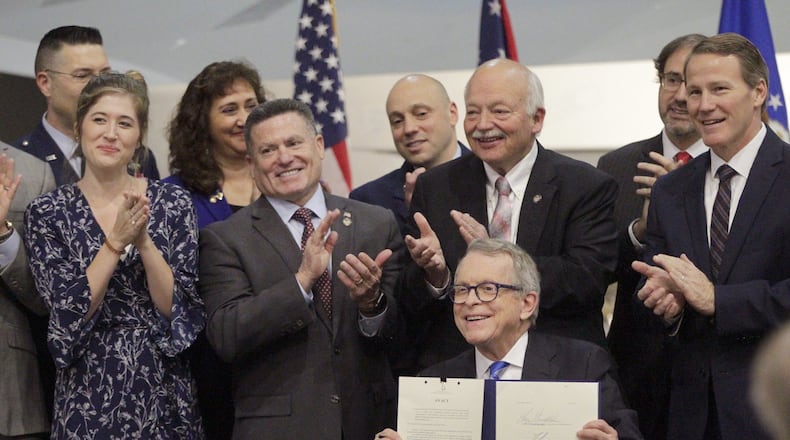As McKinnon — a Washington state special education teacher who lived in Ohio — argued for the bill, she found herself testifying before Ohio legislators several times and personally briefing U.S. Secretary of Defense Mark Esper on the legislation at the Pentagon.
MORE: New WSU president: Building community trust first step for university
McKinnon found on moving to Ohio that if she wished to teach here, she had to take a university course and spend nearly $500 on a trio of exams.
“I said ‘No,’” said McKinnon, who started pushing for the bill before moving back to Washington from Ohio. “I started calling everyone and eventually ran into (bill sponsor Ohio Rep. Rick) Perales. We talked, and that was the start of this two-year fight to get this bill passed.”
Perales, a Beavercreek Republican, said colleagues almost immediately saw the value of the legislation, but the process was cumbersome and time-consuming.
“It’s not an easy process,” said Perales, a former Air Force officer. “Even something as good as this. It ended up going, and it was unanimous in both chambers, but to get to that point, it took some time.”
“When I looked, there were 86 special ed(ucation) positions open,” said Kosobud, a West Carrollton special education teacher who found herself in a predicament to similar to McKinnon’s.
“I had all of the criteria to do that. I had a job that accepted me, but then Ohio turned down my licensure,” added Kosobud, who moved to Ohio from Virginia. “I had a master’s in special education, a 10-year professional license in a different state, but Ohio would not recognize that.”
MORE: Express to close nearly 100 stores
The bill will make it easier for service members and their spouses to use their professional licenses from other states, advocates say.
The idea in part is to make Ohio more friendly and welcoming to military families, something the DeWine administration has identified as a priority. The bill offers a pathway for licensing in an array of occupations, including nurses, home health aides, dental assistants and other occupations.
“This bill is one way of helping those family members,” DeWine said in remarks before signing the bill.
U.S. Rep. Mike Turner, R-Dayton, said Esper followed the course of the state legislation with interest.
“This was an injustice and probably a surprise for most individuals,” Turner said of previous licensure requirements.
In a release Monday, the Dayton Development Coalition said it’s an issue that former Air Force Secretary Heather Wilson has raised with coalition leaders.
In 2018, Wilson, with the other service secretaries, said that occupational licensing reciprocity and quality of local schools will be considered in choosing bases for additional missions, the coalition noted.
Perales, Ohio Lt. Gov. Jon Husted and others at the signing ceremony Monday pointed to data showing that spousal joblessness is one of the biggest burdens military families can bear. Such families can be reassigned to different locales every two or three years, if not more often.
McKinnon, who flew to Ohio Monday from Washington for the signing ceremony, said her advice to military spouses is simple: “You can be heard. Call your state representative and tell them how you can fight for all of us.”
“The families of those who are serving our country should not be deprived of the right to earn a living by needless regulation,” said Robert Alt, president and chief executive of the Buckeye Institute.
About the Author

